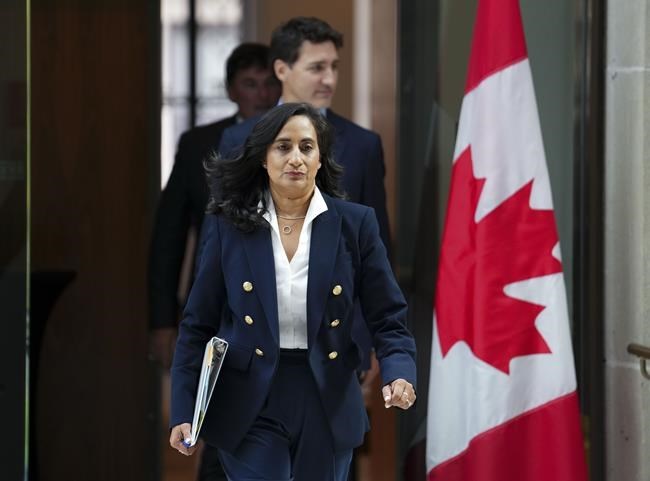OTTAWA — Canada is sending 40 military engineers to Poland to train Ukrainian forces in their fight against Russia, following airstrikes on civilians that have G7 leaders pledging to support Kyiv "for as long as it takes."
The new aid comes days after an explosion damaged an important bridge connecting Russia and the Crimean peninsula. That cut off a major military supply route Saturday for Russia, which annexed the area in 2014.
The Ukrainian government applauded the move, but nobody claimed responsibility as of Tuesday afternoon.
In retaliation, Russian President Vladimir Putin ordered missile strikes on several Ukrainian cities Monday, killing civilians and damaging key infrastructure in attacks the UN human rights office deemed "particularly shocking."
"The Russians' missile strikes on civilians, on innocents, people commuting to work (and) kids playing in parks, are targeted at civilians and civilian infrastructure," Trudeau said Tuesday at an unrelated event in Quebec
Earlier that day,Defence Minister Anita Anand had announced the new training deployment during a visit to Warsaw, before a planned meeting with NATO counterparts in Belgium.
The Department of National Defence says the engineers will be attached to a Polish-led training effort focused on teaching Ukrainians how to use explosives, among other things.
The new contribution is on top of approximately 225 military trainers already working with Ukrainian forces as part of a British-led training mission.
It is also in addition to the deployment of three Hercules transport planes to Scotland, where the aircraft are helping deliver supplies to Ukrainian forces.
Trudeau phoned Ukrainian PresidentVolodymyr Zelenskyy about the airstrikes, pledging more sanctions on Russia as well as more military and humanitarian aid.
Zelenskyy has asked for some sort of air shield to intercept Russian missiles, and Trudeau did not answer when asked whether Canada would support or rule out that idea.
In March, Ottawa steered away from Zelenskyy's demands for a no-fly zone, citing the risk of the West entering direct, armed conflict with Russia.
Canada summoned Russia's ambassador Monday over the airstrikes, and the leaders of the G7, representing some of the world's advanced economies, decried the events as possible war crimes.
"We will continue to provide financial, humanitarian, military, diplomatic and legal support and will stand firmly with Ukraine for as long as it takes," read a joint statement released Tuesday.
The G7, which includes Canada, said it supports an end to the war that recognizes Ukraine's sovereignty and holds Russia accountable for the war, including having that country fund Ukraine's reconstruction.
Trudeau argued that the Russian airstrikes speak to desperation.
The head of Britain's cyberintelligence agency, Jeremy Fleming, said Tuesday that Russia is running out of military supplies and struggling to fill its ranks.
"Russia's forces are exhausted," Fleming said. "The use of prisoners as reinforcements, and now the mobilization of tens of thousands of inexperienced conscripts, speaks of a desperate situation."
In a Tuesday press briefing, Russia's foreign ministry claimed the strike on the bridge to Crimea amounted to a terrorist attack that merited retribution.
The ministry also urged Ottawa not to offer more arms and training to Ukraine's military, arguing it prolongs the fighting.
"The Russian-Canadian relationship is, unfortunately, in a deep crisis," spokeswoman Maria Zakharova said in Russian.
"It's the fault of Ottawa officialdom, because it follows the anti-Russian path that it has been doing for a long time, at the behest of the Trudeau regime."
Zakharova also said that as of Tuesday, Russia's embassy in Ottawa had not received any update about the RCMP probe into a Molotov cocktail allegedly being thrown over the fence a month ago, without exploding.
The RCMP did not immediately respond to a request for comment.
"It's been a month now, and the Canadian police have not bothered to inform the embassy about the initial results of the investigation," Zakharova said, echoing the embassy's call for round-the-clock police protection.
"This is customary in all countries that consider themselves civilized."
This report by The Canadian Press was first published Oct. 11, 2022.
— With files from The Associated Press and from Morgan Lowrie in Sorel-Tracy, Que.
Dylan Robertson and Lee Berthiaume, The Canadian Press



